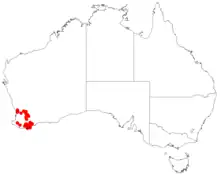| Styphelia cymbiformis | |
|---|---|
| Scientific classification | |
| Kingdom: | Plantae |
| Clade: | Tracheophytes |
| Clade: | Angiosperms |
| Clade: | Eudicots |
| Clade: | Asterids |
| Order: | Ericales |
| Family: | Ericaceae |
| Genus: | Styphelia |
| Species: | S. cymbiformis |
| Binomial name | |
| Styphelia cymbiformis | |
 | |
| Occurrence data from AVH | |
| Synonyms[1] | |
Styphelia cymbiformis is a flowering plant in the family Ericaceae and is endemic to the south-west of Western Australia. It is a bushy or wiry shrub that typically grows to a height of 30–50 cm (12–20 in) and has more or less glabrous branches. Its leaves are erect, linear to lance-shaped and sharply-pointed, mostly 2–4 mm (0.079–0.157 in) long. The flowers are arranged in short spikes, sometimes of only two or three flowers, with lance-shaped, leaf-like bracts, and bracteoles half as long as the sepals at the base of the spikes. The sepals are 2.5–3.0 mm (0.098–0.118 in) long and the petals slightly longer than the sepals, the lobes shorter than the petal tube.[2]
Leucopogon cymbiformis was first formally described in 1839 by Augustin Pyramus de Candolle in his Prodromus Systematis Naturalis Regni Vegetabilis from an unpublished description by Allan Cunningham.[3][4] In 1867, Ferdinand von Mueller changed the name to Styphelia cymbiformis in his Fragmenta Phytographiae Australiae.[5] The specific epithet (cymbiformis) means "boat-shaped", referring to the leaves.[6]
This styphelia grows in the Avon Wheatbelt, Esperance Plains and Jarrah Forest bioregions of south-western Western Australia.[7]
References
- 1 2 "Styphelia cymbiformis". Plants of the World Online. Retrieved 23 November 2023.
- ↑ Bentham, George; von Mueller, Ferdinand (1868). Flora Australiensis. Vol. 4. London: Lovell Reeve & Co. pp. 200–201. Retrieved 25 July 2022.
- ↑ "Leucopogon cymbiformis". APNI. Retrieved 25 July 2022.
- ↑ de Candolle, Augustin P. (1839). Prodromus Systematis Naturalis Regni Vegetabilis. Vol. 7. Paris. p. 750. Retrieved 25 July 2022.
- ↑ "Styphelia cymbiformis". APNI. Retrieved 23 November 2023.
- ↑ Sharr, Francis Aubi; George, Alex (2019). Western Australian Plant Names and Their Meanings (3rd ed.). Kardinya, WA: Four Gables Press. p. 176. ISBN 9780958034180.
- ↑ "Leucopogon cymbiformis". FloraBase. Western Australian Government Department of Biodiversity, Conservation and Attractions.
